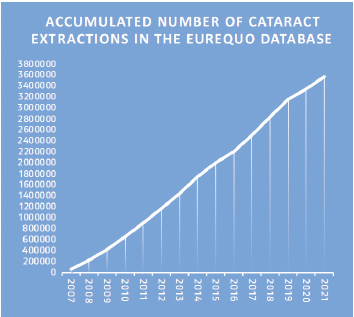Cataract, Refractive
EUREQUO registry provides a mine of valuable data

With more than 3.6 million cataract cases and over 150,000 refractive surgeries now recorded since its launch in 2008, the European Registry of Quality Outcomes for Cataract and Refractive Surgery (EUREQUO) continues to yield extremely valuable data on surgical practices and outcomes.
Funded by the ESCRS, with initial support from the EU, EUREQUO is one of the largest international IT projects in ophthalmology, connecting surgeons all over the world and building a network to facilitate the exchange of expertise. All ESCRS members can access the registry free of charge.
By collecting data, surgeons can monitor their results over time and anonymously compare with other colleagues, clinics, and countries. Cataract, refractive, and patient-reported outcomes are all available in one web-based platform.
“EUREQUO provides a means to audit surgical results and encourages surgeons to make adjustments to their techniques and improve their outcomes,” said Mats Lundström MD, PhD, the original driving force behind EUREQUO and now a member of the EUREQUO Steering Committee.
For its part, the ESCRS believes that a continuing audit of surgical outcomes is necessary to ensure the best care for patients—by making comprehensive data available for visual outcome comparisons.
The number of cataract extractions reported to the database in 2021 was 219,672, with a mean patient age of 74 years and 57% women. In 7.9% of the cases, the preoperative corrected distance visual acuity (CDVA) was 0.1 or below, and in 49.1%, the CDVA was 0.5 or better. In 25.3%, there was a co-existing eye disease in the surgery eye.
The registry also contains data about surgical difficulties, type of operation, IOL optic biomaterial, and surgical complications. For 74,781 cases, follow-up data were also reported. A refractive surgery was reported for 1,801 eyes.
Dr Lundström said the EUREQUO Steering Committee is constantly updating the platform with new parameters to reflect the development of new surgical techniques and trends in the field. The committee is also committed to analysing the aggregate data of the database and developing new scientific papers.
It has already released 16 publications to date, and more are in the pipeline.
Such a big registry is very suitable for studies of rare events in terms of complications or preoperative conditions, Dr Lundström noted.
To this end, the registry has generated studies on cataract surgery outcomes in eyes with previous corneal refractive surgery, risk factors for dropped nucleus and posterior capsule rupture, and cataract surgery in eyes with previous vitrectomy.
Looking to the future, EUREQUO plans to continue expanding into new regions and adding more surgical data. Earlier this year, the registry started to include data on refractive surgery in the Netherlands as well as cataract data from France.
Further information on EUREQUO is available at www.escrs.org/about-escrs/registries/eurequo/

Tags: Eurequo, 40th Congress of the ESCRS
Latest Articles
Towards a Unified IOL Classification
The new IOL functional classification needs a strong and unified effort from surgeons, societies, and industry.
The 5 Ws of Post-Presbyopic IOL Enhancement
Fine-tuning refractive outcomes to meet patient expectations.
AI Shows Promise for Meibography Grading
Study demonstrates accuracy in detecting abnormalities and subtle changes in meibomian glands.
Are There Differences Between Male and Female Eyes?
TOGA Session panel underlined the need for more studies on gender differences.
Simulating Laser Vision Correction Outcomes
Individualised planning models could reduce ectasia risk and improve outcomes.
Need to Know: Aberrations, Aberrometry, and Aberropia
Understanding the nomenclature and techniques.
When Is It Time to Remove a Phakic IOL?
Close monitoring of endothelial cell loss in phakic IOL patients and timely explantation may avoid surgical complications.
Delivering Uncompromising Cataract Care
Expert panel considers tips and tricks for cataracts and compromised corneas.
Organising for Success
Professional and personal goals drive practice ownership and operational choices.